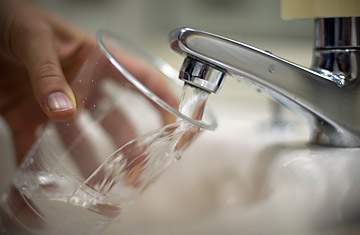
Water runs from a tap in Osaka, Japan
Tokyo is not one of those cities where I normally worry about drinking the water. In fact, there's something quite delightful about a country in Asia where I can freely swig from the tap. But this afternoon, as I filled up a glass at my hotel, I hesitated. It wasn't like what I was looking for could be detected. Radioactive isotopes are, as we all know by now, colorless, tasteless and odorless. I put the glass down. Maybe I wasn't that thirsty after all.
On March 23, the Tokyo government announced that the level of radioactivity in the city's water, caused by radioactive iodine emanating from the quake- and tsunami-damaged Fukushima Daiichi nuclear power plant 149 miles (240 km) to the north, had exceed safe levels for infants. I am not an infant. Nor do I panic easily. But like many Japanese who have been determined not to let trace amounts of radiation get to them, this news spooked me. Indeed, on Thursday, anxious Tokyo citizens cleaned bottled water off shelves, leaving only bottles of expensive Perrier in some stores.
As the Daiichi plant has continued to infect the region's air and water, Tokyo citizens have gone through cycles of alarm and ennui. A few days ago, when government officials announced trace amounts of radiation in milk and vegetables from farms not far from the nuclear plant, people grabbed whatever milk they could find in stores that was produced before the radiation tests ran positive. Dairy disappeared. But now milk and yogurt are easier to find in Tokyo, as officials have assured residents that the dairy they're consuming is safe. (Milk and certain vegetable exports from the affected region near the Daiichi plant have been stopped, easing fears.) The milk run has given way to the water scare.
What's interesting to me about Tokyo's reaction to the radioactivity issue is the level of trust that locals essentially have for their government, even if there is a reflexive unease about radiation given Japan's history as the only nation ever to have been attacked by atomic weapons. Compare Japan to China, where vague rumors of Japanese radioactivity making their way west toward the Middle Kingdom prompted a massive run on iodized salt. Why? Because people thought the iodine in the salt could counteract a radioactive haze. The assumption was wholly incorrect, and the whole scene became even more ridiculous when the iodized salt run in turn sparked a run on noniodized salt. The lesson, though, was this: Chinese people don't trust their government. Therefore, stocking up on whatever remedy they can find is a perfectly natural reaction in a country where citizens believe they must fend for themselves.
By contrast, Japanese tend to trust that their health inspectors are doing their job. And when the issue is something as basic as water, eschewing it completely from one's diet is all but impossible. I bet that many of the Japanese drinking bottled water at ramen noodle soup restaurants on Thursday weren't thinking about the fact that the broth they were consuming was probably made with potentially tainted water. In fact, I was halfway through my own bowl of soup when that thought occurred to me. I finished the bowl.
By late Thursday, Tokyo health officials had announced that the amount of radioactive iodine in one major water purification plant had dropped to levels safe even for infants. The run on water in Tokyo will likely soon abate, unless levels spike even higher. (By contrast, the China salt scare took far longer to calm down.) In fact, the general consensus in Tokyo appears to be not only that the government should be trusted on these matters but also that foreigners are making too big a deal out of all this radioactivity stuff. Many Tokyo residents were shocked by how quickly a large expatriate corps fled the capital after the onset of the nuclear crisis. It was wounding for a city that prides itself on hospitality and livability. Now there's a paranoid strain of thought, particularly among some conservative Japanese media, that the outside world is obsessing about each radioactive becquerel as some sneaky way to hurt Japan's image.
The problem is that the Japanese government doesn't have a spotless history when it comes to informing the public about potential health risks. Indeed, in some cases, the bureaucracy's reaction has been to deny, deny, deny before finally admitting that maybe something had gone awry. In fact, Prime Minister Naoto Kan made his name in the mid-1990s when he fully exposed the fact that the Health Ministry had covered up the administering of HIV-tainted blood to hemophiliacs.
That's not to say the government is fooling people now. Indeed, with the constant tests and calls for vigilance, Tokyo health officials appear to be bending over backward to show the populace that they are monitoring the situation carefully. On Thursday, Tokyo government workers began delivering bottled water to all 80,000 local families with infants, as promised by Kan. About 240,000 bottles were scheduled to be delivered on Thursday, according to Tokyo Governor Shintaro Ishihara. The exercise is set to be repeated on Friday. If radiation levels creep back up, then the government may even import bottled water to meet the demand. But who wants to cook with Perrier?
